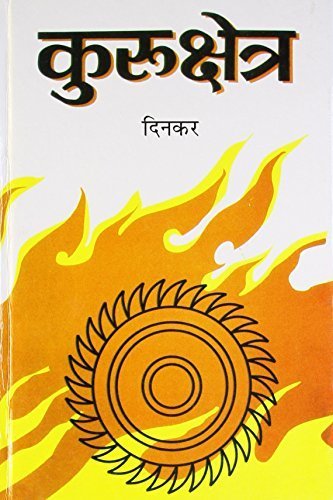Kurukshetra

Rating: 4.3/5
Author: Ramdhari Singh Dinkar
Publisher: Rajpal and Sons
Publishing Date: January 2013
Language: Hindi
Genre: Mythology, Poetry
ASIN: B01M6B20CA
Format: Paperback, Kindle edition (584 KB)
Pages: 120
Plot:
Kurukshetra is a Hindi classic. It gives an extraordinary account of the Kurukshetra war mentioned in the Mahabharata. It describes in vivid details the armed confrontation that took place between the Pandavas and the Kauravas. This epic battle lasted eighteen days.
The poet’s personal views on war are showcased in this work. Ramdhari Singh Dinkar criticizes war but also admits that it is a necessary evil. It describes the demerits of war and the damage it does to mankind, through the medium of poetry.
Review:
In Kurukshetra, Dinkar accepted that the epic war is destructive but argued that it is necessary for the protection of freedom. In a situation where one's country's freedom is threatened, one must defend oneself even if one has to resort to war. The importance of power is also emphasized. The negative consequences of war have been highlighted through the dialogues between Bhishma and Yudhisthira and the latter's remorse over his own actions.
The problem of war is the root of human vices. Dinkar's 'Kurukshetra' asks important and pertinent questions like- War is blasphemy and cruel deeds, but who should be responsible for it? Who invites retaliation by laying a web of evils? Who is ready to compromise?
Dinkar sharply criticizes man absorbed in material comforts. The poet hopes for a society based on equality. This will be possible only when all kinds of immoralities are destroyed. This requires working on excluding the idea that everything is predetermined and therefore is inevitable. He wants his readers to understand that whatever a man is today, it is only because of his ‘karma’. He considers only one religion that is- Human Religion or Humanity which in turn refers to helping the oppressed and destroying the darkness from their lives.
The rhythm he uses to redefine historic mythological events is beyond tempting. For example this is how he communicated the epic ‘Draupadi saree haran’ incident:
ज्यों ज्यों साड़ी विवश द्रोपदी
की खिंचती जाती थी,
त्यों–त्यों वह आवृत,
दुरग्नि यह नग्न हुयी जाती थी ।
About the Author:
Ramdhari Singh Dinkar (23 September 1908 - 24 April 1974) was a renowned Hindi essayist, critic and poet from before the Indian Independence era. He remerged as a poet of rebellion as a consequence of his nationalist poetry written in the days before Indian independence. He was also a freedom fighter. He was a member of Parliament. He was highly influenced by Gandhi and the Gandhian movement. He received many awards for his contributions to Hindi literature. His poetry used to be overflowed with ‘veer rasa’ and he has been hailed as a Rashtrakavi (National poet).
As a mark of respect for him, his portrait was unveiled in the Central Hall of Parliament of India by the former Prime Minister of India, Dr. Manmohan Singh on his centenary year, 2008. He received awards from Kashi Nagri Pracharini Sabha, U.P Government and also an award by the Government of India for his epic-poem ‘Kurukshetra’. He was awarded the Sahitya Akademi Award in 1959 for his work ‘Uravshi’. He was also a recipient of Padma Bhusan in 1959 by the Government of India. Dinkar was awarded the Jnanpith Award in 1972 for Urvashi.















































